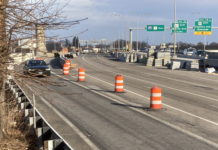Disappointed by Gov. Lincoln D. Chafee’s veto of legislation to give them the right to sue insurance companies in payment disputes, auto-body shops say they’ll continue the fight next year.
If they are successful, however, insurers claim Rhode Island automobile-insurance rates will go through the roof. The Property & Casualty Insurers Association estimates the legislation approved by the General Assembly would have increased auto-insurance premiums by an average of $164.
Insurers point to the fact that the Ocean State has the seventh-highest annual insurance premium in the country and say consumers cannot bear another increase.
Of the six New England states and New York, Rhode Island has the highest annual auto-insurance rate, $1,830, according to a newly released study conducted for Quadrant Information Services of Nevada. Maine was the lowest with $889 while, on the other extreme, Louisiana is the most expensive, at $2,536. Maine’s results were credited to low traffic density, active competition among carriers, low crime rates and a lack of recent natural disasters.
So why are Rhode Island rates already so high?
According to the R.I. Department of Business Regulation, the greatest influence on a premium is the claims frequency of the policyholder and their place of residence.
Rhode Island’s small size and population density are also factors, as are severe winter weather that can increase the likelihood of accidents. Summer tourism – which brings out-of-state travelers – also adds to the increased possibilities of traffic accidents. These factors combined with over 1 million residents have caused the average monthly premiums to be around $50 per month higher than the national average, according to data from the Insurance Research Council, a nonprofit research organization supported by the insurance industry, published by insure.com, a website owned by QuinStreet Inc., an Internet marketing and media company.
Gary Henning, Northeast regional vice president for the American Insurance Association, says the state’s labor costs for repairs exceed the national average by 26.7 percent.
Henning did not, however, have a history of figures documenting repair costs nor personal liability.
Auto-body shops dispute Henning’s contention.
“[The cost] has nothing to do with auto repair, in fact it has to do with liability, injuries,” claimed Jina Petrarca-Karampetsos of Petrarca & Petrarca of Providence and a legal representative for the Auto Body Association of Rhode Island.
And auto-body shops say they are at the mercy of insurers because in Rhode Island, there’s no requirement for an insurance agency to negotiate on how much they will pay to help cover repairs.
So that means, insurers can effectively pay auto-body shops what they want, Petrarca-Karampetsos said. The legislation vetoed by Chafee would create an incentive for the insurers to negotiate, she said.
Chafee, however, said the bill “would hurt Rhode Island consumers by raising their auto-insurance rates and impairing their existing contract agreements with their insurance companies.”
Henning said a “truce” between the two sides was agreed upon last year “with the hope of having some discussions over the next year, so that an agreeable legislation could be submitted to the legislature. Unfortunately there was no agreement.”
For auto-body shops, the dispute is about their desire to challenge unfair practices – low quotes – by insurance companies.
Insurers, however, say rates they charge will have to rise to cover their potentially higher share of repair costs in such cases, without factoring in the fairness of the actual repair charges.
“No other state in the nation allows auto-body shops to set nonnegotiable prices,” Henning said. •
No posts to display
Sign in
Welcome! Log into your account
Forgot your password? Get help
Privacy Policy
Password recovery
Recover your password
A password will be e-mailed to you.












